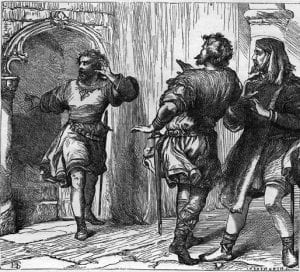Better Dead Than Red and the Royal Fleeing
This is the second out of three of my TWIL (this week I learned) posts. Once again I will be covering two topics, and making a connection between them. In class, as we make our way through Macbeth, and American history of the 1950’s, I’ve made yet more connections to Shakespeare’s world, and ours.
Homophobia in the “Reds” Crisis
Not long after the detonation of the first atom bomb, and the US victory, America took a nice deep breath and had a seat in its white picketed fenced yard for the first time in forever. There was finally time for leisure, and a “normal” life. At least thats how the people of America wanted it to be. But there were still many stains in the carpet that they couldn’t ignore, one very important one being the “reds crisis”.
A couple years after World War II had ended, America was  turned upside down by the discovery of two Soviet Union spies in the US atomic program. While the US had been making world changing atomic discoveries these spies were known to have been contacting the Soviet Union, relaying information, which resulted in the Soviet Union’s atomic bomb success in 1949. This discovery led America as a whole into a blacklisting frenzy. Once a person is blacklisted their life in America would be ruined. Immigrants were sent back to their home countries, people were fired from their jobs, and many went to jail.
turned upside down by the discovery of two Soviet Union spies in the US atomic program. While the US had been making world changing atomic discoveries these spies were known to have been contacting the Soviet Union, relaying information, which resulted in the Soviet Union’s atomic bomb success in 1949. This discovery led America as a whole into a blacklisting frenzy. Once a person is blacklisted their life in America would be ruined. Immigrants were sent back to their home countries, people were fired from their jobs, and many went to jail.
During this blacklisting frenzy, the FBI would be “red hunting”, and observing the lives of suspects, as communists became known as a threat to American society. The minorities of America were immediately suspects, minorities such as homosexuals. During these FBI hunts, suspected homosexuals would be asked extremely personal questions, they’d be watched, and be monitored. And in the 1950’s, speaking about, or presenting yourself as any sexuality other than heterosexual was taboo. So many men, and women would sneak around to live this other part of their lives. This made the FBI even more suspicious of the homosexual community at the time.
observing the lives of suspects, as communists became known as a threat to American society. The minorities of America were immediately suspects, minorities such as homosexuals. During these FBI hunts, suspected homosexuals would be asked extremely personal questions, they’d be watched, and be monitored. And in the 1950’s, speaking about, or presenting yourself as any sexuality other than heterosexual was taboo. So many men, and women would sneak around to live this other part of their lives. This made the FBI even more suspicious of the homosexual community at the time.
The Fleeing of Malcolm, and Donalbain
In act two, Macbeth begins his downward spiral of killing with the murder of King Duncan, while he visits the Macbeth castle. Malcolm, and Donalbain, the sons of King Duncan, who were also staying at the Macbeth castle, along with Macduff are the first ones to find their fathers bloody corpse. When the hosts: Lady Macbeth, and Macbeth are “alerted” of the murder of the King they rush into the room and act in astonishment. As the reader has learned from act one, Macbeth isn’t the best of actors, his reaction to the corpse was extremely over exaggerated, and led to suspicion from Macduff.
murder of King Duncan, while he visits the Macbeth castle. Malcolm, and Donalbain, the sons of King Duncan, who were also staying at the Macbeth castle, along with Macduff are the first ones to find their fathers bloody corpse. When the hosts: Lady Macbeth, and Macbeth are “alerted” of the murder of the King they rush into the room and act in astonishment. As the reader has learned from act one, Macbeth isn’t the best of actors, his reaction to the corpse was extremely over exaggerated, and led to suspicion from Macduff.
The two sons make the plan to both flee Scotland, and divide their wealth for more security. Donnalbain goes to Ireland, and Malcom goes to England to help Macduff form an army to gain vengeance on Macbeth, as they would be much safer from assassination if they were separate. Once the rest of the Macbeth castle wakes up the morning after the murder, they notice the absence of Donnalbain, and Malcolm, and because of their lack of explanation for their fleeing, they are immediately suspected for their fathers murder.
The Big Connections
#1: Within both of these instances people are accused incorrectly based solely on assumption as well as bias
#2: Both Malcolm, and the LGBTQ+ community became stronger through the hardships they endured. Malcolm, and Macduff’s army end Macbeth’s reign over Scotland for good, and the LGBTQ+ community has hit many milestones since the 1950’s, bringing us closer, and closer to the equality deserved.
#3: The downward spiral that Macbeth begins on after murdering King Duncan has similar effects to the first discovery of the Soviet spies. The first occurrence, leads to a frenzy.
Earlier in the post, I included the original poster on the left. This poster was meant to encourage people to help the FBI rid the country of communists. I had the idea to create a similar poster for the death of King Duncan as if the same type of communication was used in the Victorian age as the 1950’s.
This artifact compares the similarity between the way people approached conflict back in the Victorian age, and the 1950’s. And ignites the idea of: when something out of the ordinary happens, people begin to blame others with lack of evidence.
My Sources are Listed Below:
https://www.enotes.com/homework-help/duncans-sons-decide-o-leave-scotland-after-their-318501
https://www.enotes.com/homework-help/what-prompts-people-think-that-malcom-donalbain-70751
